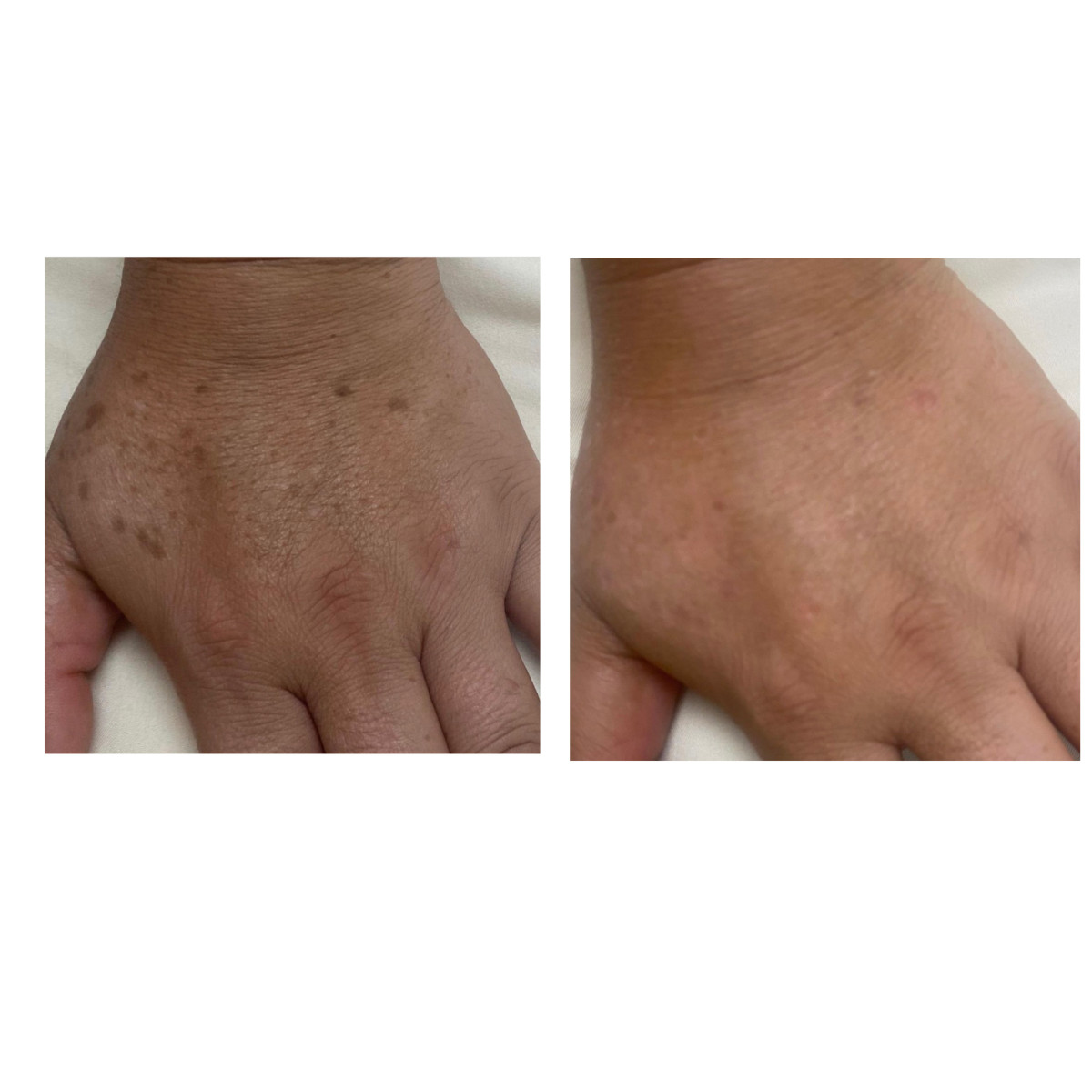“Ultimate Guide: Body Hyperpigmentation and Acne – Causes, Prevention, and Treatment”
1. What causes body hyperpigmentation and acne?
Hello there! My name is Letizia Ciruolo, master aesthetician, and laser technician with 24 years of experience at Venus Spa. Today, I will dive into a topic that is very sensitive and sometimes also a cause of low self-esteem: body acne and hyperpigmentation. We’ve all struggled or are struggling with these problems. Let’s talk about what causes body hyperpigmentation and acne.
Body hyperpigmentation presents as irregular dark patches or spots on the skin, causing an uneven complexion. These spots, commonly referred to as age spots or sun spots, are indicative of variations in skin pigmentation. Conditions like melasma and post-inflammatory hyperpigmentation also stem from this phenomenon. Individuals with Fitzpatrick phototypes 3 – 6, characterized by higher melanin levels, often exhibit more pronounced hyperpigmentation compared to those with phototypes 1 & 2.
Body acne refers to the presence of acne lesions or breakouts on areas of the body other than the face, such as the chest, back, shoulders, and buttocks. Similar to facial acne, body acne can manifest as blackheads, whiteheads, pimples, cysts, or nodules.
The causes of body hyperpigmentation and acne can vary, but some common factors include hormonal changes, genetics, inflammation, excessive sun exposure, certain medications, and skincare products that clog pores.
Hormonal changes can contribute to acne and hyperpigmentation through several mechanisms:
1. Increased sebum production: Hormonal fluctuations, especially during puberty, menstruation, pregnancy, or menopause, can stimulate the sebaceous glands to produce more oil (sebum). Excess sebum can clog pores and lead to acne breakouts.
2. Inflammation: Hormonal changes can trigger inflammation in the skin, which can exacerbate acne lesions and contribute to hyperpigmentation. Inflammatory acne lesions are more likely to cause skin discoloration once they heal.
Let’s dive into hormonal changes in women and men:
• Women: Hormonal fluctuations throughout the menstrual cycle, pregnancy, childbirth, and menopause can influence acne development and hyperpigmentation. Fluctuations in estrogen and progesterone levels, especially during the menstrual cycle, can affect sebum production and skin cell turnover, leading to breakouts before or during menstruation.
• Men: Androgens, such as testosterone, play a significant role in acne development in men. Testosterone stimulates the sebaceous glands and contributes to increased sebum production. Hormonal imbalances or fluctuations in men, such as those associated with puberty or certain medical conditions, can lead to acne flare-ups and hyperpigmentation.
SUN EXPOSURE : acne/ hyperpigmentation
Sun damage can make acne worse and lead to darker spots on the skin. It increases inflammation, slows healing, and makes existing spots more noticeable. To protect your skin, wear sunscreen daily, seek shade, and avoid tanning beds.
People often wonder why the sun seems bad for acne when it can dry out pimples. While it may initially dry out acne lesions, sun exposure ultimately worsens acne by increasing inflammation and prolonging healing time, leading to more severe breakouts.
MEDICATIONS: acne/ hyperpigmentation
Certain medications can exacerbate acne and hyperpigmentation as side effects. Some medications, such as corticosteroids, hormonal treatments, anticonvulsants, and lithium, can trigger or worsen acne breakouts by affecting hormone levels, increasing oil production, or causing skin irritation. Additionally, certain medications, like some antibiotics and chemotherapy drugs, can make the skin more sensitive to the sun, leading to increased risk of sun-induced hyperpigmentation.
SKIN CARE PRODUCTS: and acne and hyperpigmentation
Certain skincare products can indeed cause acne and hyperpigmentation, especially if they contain comedogenic (pore-clogging) ingredients or irritants. Additionally, using harsh or abrasive products can disrupt the skin’s barrier function, leading to inflammation and potentially exacerbating acne and hyperpigmentation. It’s essential to choose products specifically formulated for your skin type and concerns and to patch-test new products before using them on your entire face. Also make sure you use only medical grade products.
Common skincare ingredients like coconut oil, cocoa butter, certain silicones, alcohol, fragrances, and heavy emollients can clog pores, trigger inflammation, and worsen acne and hyperpigmentation for some individuals
As someone with years of experience in aesthetics, I can confidently say that preventing body hyperpigmentation and acne requires a thoughtful skincare approach. Here’s what I’ve learned:
1. Sun protection is key: Years of practice have taught me the importance of sunscreen in preventing hyperpigmentation and acne. Daily application of SPF 30 or higher is essential to shield the skin from harmful UV rays.
2. Gentle care yields results: I’ve found that gentle cleansing is crucial for maintaining healthy skin. Harsh products can disrupt the skin’s balance and exacerbate acne, so I always recommend gentle cleansers to my clients.
3. Hydration is non-negotiable: Moisturizing regularly is a must to keep the skin hydrated and resilient. Opting for non-comedogenic moisturizers helps prevent clogged pores and acne breakouts.
4. Nutrition matters: Over the years, I’ve seen firsthand the impact of diet on skin health. Encouraging my clients to eat a balanced diet rich in fruits, vegetables, and water can help prevent acne flare-ups and support overall skin health.
5. Stress management is essential: Stress can take a toll on the skin, leading to breakouts and exacerbating hyperpigmentation. Incorporating stress-reducing practices like meditation or yoga can make a noticeable difference in skin clarity and tone.
6. Product selection is critical: With years of experience, I’ve learned that choosing the right skincare products is key. Opting for gentle, non-comedogenic formulations and patch-testing new products helps minimize the risk of irritation and breakouts.
3. What are the best treatments for body hyperpigmentation and acne?
1. Chemical peels: Utilizing ingredients like glycolic acid, salicylic acid, or lactic acid, chemical peels can exfoliate, fade hyperpigmentation, and clear pores, improving acne.
2. Topical retinoids: Prescription promotes cell turnover, fade hyperpigmentation, and prevent acne by keeping pores clear.
3. Laser therapy: Treatments like IPL or fractional laser resurfacing target hyperpigmentation, stimulate collagen, and may have antibacterial effects to combat acne.
4. Microdermabrasion: This mechanical exfoliation removes dead skin cells, unclogs pores, and improves the appearance of hyperpigmentation and acne scars.
5. Microneedling: Using tiny needles to create controlled micro-injuries, microneedling stimulates collagen production, improving acne scars and hyperpigmentation.
6. Topical treatments: Prescription hydroquinone, azelaic acid, or kojic acid target hyperpigmentation, while benzoyl peroxide, salicylic acid, or topical antibiotics treat acne.
7. Combination therapy: Often, combining treatments is most effective.
At Venus Spa, we offer all these treatments, and our 24 years of experience enable us to help you find the best treatment and skincare routine tailored to your needs. Simply follow our instructions, and we’ll take care of the rest. Your journey to healthier, clearer skin starts here at Venus Spa.
4. Are there any home remedies or natural treatments for body hyperpigmentation and acne?
I don’t typically recommend home remedies or natural treatments as a primary solution for body hyperpigmentation and acne due to their variable effectiveness and potential for skin irritation,
5. How long does it take for body hyperpigmentation and acne to fade?
The time it takes for body hyperpigmentation and acne to fade can vary greatly depending on several factors, including the severity of the condition, the individual’s skin type, the chosen treatment methods, and consistency in following the treatment regimen.
In general, hyperpigmentation can take several weeks to months to fade significantly. With consistent use of targeted treatments such as topical lightening agents, chemical peels, or laser therapy, noticeable improvements may be seen within a few weeks, but complete resolution may take several months to a year, especially for more stubborn or deep-seated pigmentation.
Similarly, acne can take time to improve and may require ongoing treatment to prevent future breakouts. With appropriate treatment, including topical or oral medications, skincare routines, and lifestyle changes, acne lesions can begin to heal within a few weeks to months. However, it may take several months to see significant improvement, and maintaining a consistent skincare routine is essential to prevent new breakouts.
Patience is key when addressing body hyperpigmentation and acne, and it’s essential to stick with the chosen treatment plan and give it time to work.
6. What skincare products should I use to treat body hyperpigmentation and acne?
For body hyperpigmentation and acne, look for skincare products with gentle cleansers, exfoliating treatments containing AHAs or BHAs, brightening serums with vitamin C or niacinamide, acne-fighting treatments like benzoyl peroxide or salicylic acid, broad-spectrum SPF 30+ sunscreen, non-comedogenic moisturizers, and spot treatments for targeted care
At Venus Spa, we offer a range of medical-grade products that we’ve been using for 20 years. We believe that a combination of strong home care and professional treatments can help you achieve your skincare goals. Don’t feel discouraged or stuck – book your consultation, and we’ll guide you every step of the way.



